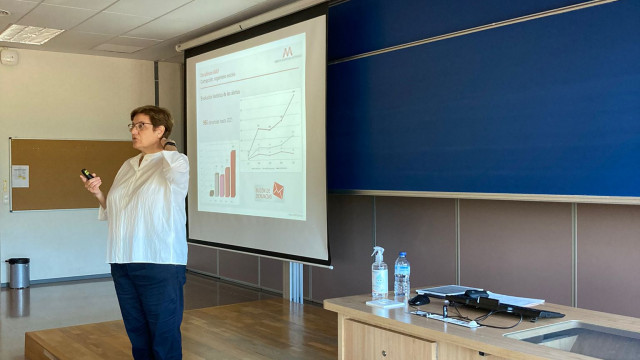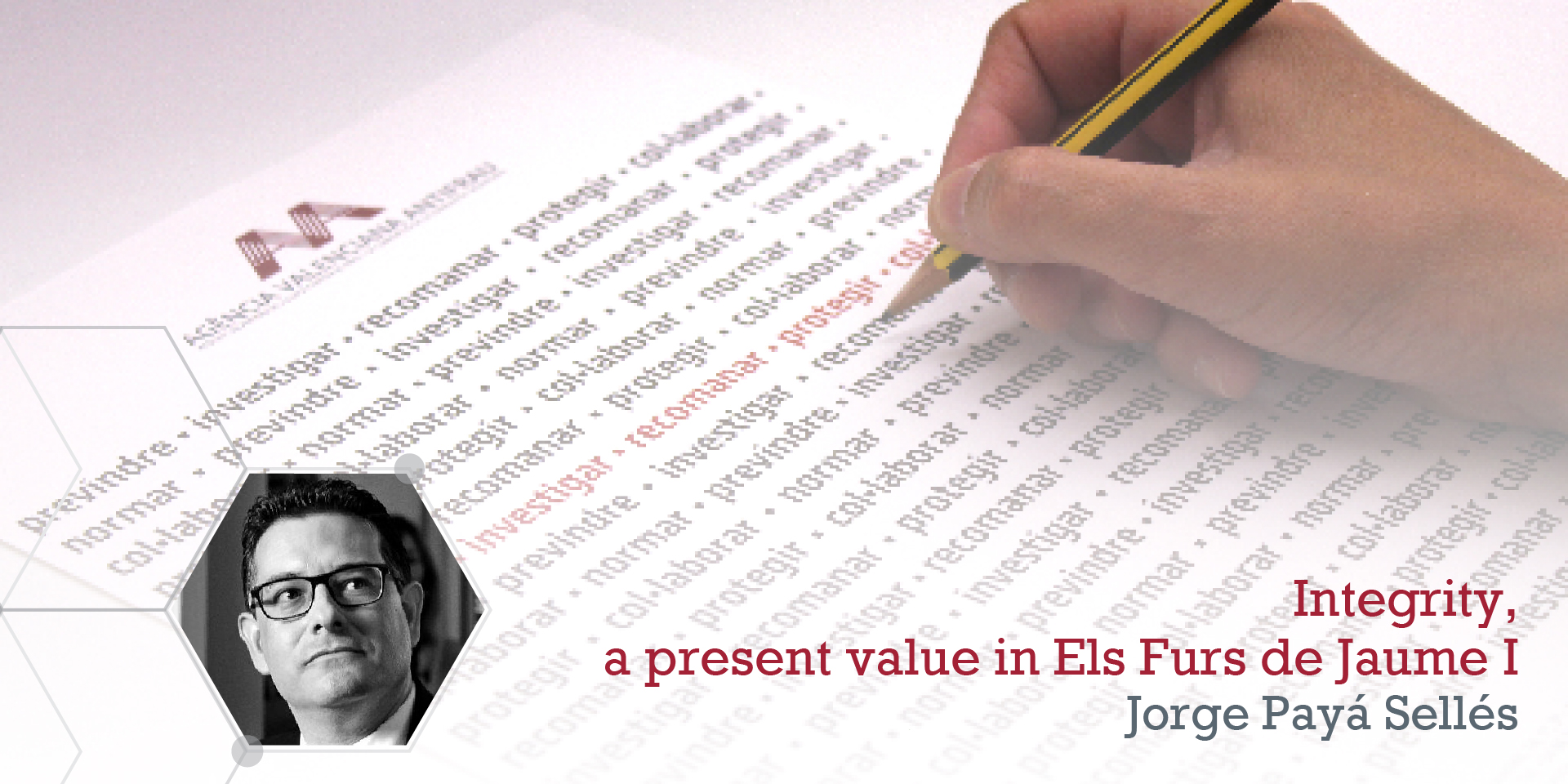The recent Law 1/2022, of April 13, on Transparency and Good Governance of the Valencian Community, specifying its general principles, defines integrity with these words:
persons in the service of the administration, whether or not they hold public office, must build trust and ensure the democratic quality of public institutions and their reputation with the public. The exercise of its functions must be characterized by impartiality, objectivity, honesty, respect for the legal framework and the observance of ethical behavior absent of arbitrariness, aimed at compliance with and satisfaction of general interests.
Thepresence of this concern and values in the Valencian legal system has its roots in the dawn of the foral stage. Indeed, in the primitive normative provisions granted by Jaume I to the city of Valencia (Consuetudines Valentiae) and in els Furs (Fori Valentiae, 1251 and Furs de València, 1261) subsequently granted in general for the whole kingdom, the integrity it permeates many of its precepts. It is a value to be preserved and a virtue to be practiced by those who exercise public offices. And, consequently, those behaviors that denote dishonesty or arbitrariness, insofar as they are contrary to integrity, must be sanctioned.
From the compilation available in the Virtual Arxiu of the UJI, of the first norms granted by Jaume I, between 1238 and 1271, to the Valencian city and town, I have made a selection of precepts that try to preserve the integral behaviors and sanction those that suppose any type of corrupt action.
The careful reading of Els Furs allows us to know the importance that integrity, as a value, has throughout the normative text. Proof of this is the phrase with which the text “Com manamens sien de dret honestament viure” begins and the justification of the need to put in writing the Law “aver memòria de totes coses e que en neguna cosa hom no·s desviàs“. Both statements clearly point to wholeness: people are to live honestly and righteously.
From an institutional perspective, inorder to regulate the cort de justícia and the officers who are to serve in it, Els Furs stipulates that the person who performs the office of batle, as well as all those who are in charge of the administration of royal revenues, shall not intervene in any criminal or civil lawsuit, “sinó tant solament los pleyts e les demandes qui seran sobre los sensals nostres o les altres rendes nostres“. Iam able to act as a lawyer or advisor to anyone.
The king wants to avoid any type of conflict of interest that may influence the proper administration of Justice and therefore makes the exercise of certain functions incompatible with others. And it prohibits the institution from requesting and receiving “cosa per donar auctoritat sua“. Currently, the conflict of interest has been regulated by the Valencian legislator through Law 8/2016, of October 28 and Decree 65/2018, of May 18. For its part, the AVAF has paid special attention to this issue through the document Reflections on conflicts of interest and the docuforum Conflicts of interest and public integrity. The gift policy, present in the articles of the Valencian transparency law (arts. 54-56), is also regulated in the avaf’s code of ethics and conduct .
Also interestingare the guarantees provided for in the Furs to preserve the impartiality of judges and courts, including the duty to abstain, even providing for the event that the reason for abstention arises during the trial:
si la cort o el jutge al començament no ere sospitós, e mentre que·l pleit de la enquisició se menarà serà feyt sospitós per alcuna novela rahó, doncs la cort do a ell altre jutge no sospitós.
Throughout the text, mandates are frequent aimed at preserving the integrity of those who perform offices of royal provision and that of those who, for some reason, are in the service of the king. Thus, for example, tenants of real rents are prevented from intervening as judges in any type of process. Royal officers may not acquire, auction or bid on an auction when the object of the auction is a real income. Inorder to prevent those who handled information by reason of the performance of a public office from benefiting from it (abuse of privileged information), they were prohibited from “comprar alcunes heretats que per juhii o per sentència de cort s’auran a vendre“. Thus, the prohibition was established that royal officers could acquire inheritances previously seized by the Justice.
In matters of judicial public faith and for those cases in which discrepancies could arise with respect to what was declared or proven in court, els Furs gave probative value to “los actes públiques que seran feytes en aquell pleyt “, above, even, what could manifest in word the court itself. To further guarantee the content of the procedural acts, the provisions of Jaume I obliged those to be written “per l’escrivà de la cort” in all processes with an amount equal to or greater than 100 solids. Likewise, the acts written in the “libre de la cort” as well as “els libres dels escrivans públichs” enjoyed a presumption of veracity.
If, despite the provisions of the Furs regarding the integrity with which the judges should behave and act, they did not proceed with rectitude and neglected their function, issuing some resolution “contra lo manament de la Costum de València“, the provisions of Jaume I made it clear that the judge thus proceeded “la dita Costum ofen e fa contra ella“. It was therefore not possible to depart from the law, nor was there justice outside the dictate of the norm. In the event that a case has been tried in accordance with the provisions of els Furs, it must be retried, and the first trial shall be declared null and void. For those cases in which the judge is corrupted, mediating promise or delivery of something, as well as in cases in which, deliberately “per sa pròpria aucturitat absolrà aquell que devie condempnar“,els Furs established that the judge be punished, reporting it to the monarch. Likewise, and with respect to the sentences that have been issued through bribery, “per jutges corromputs“, their invalidity is declared (“no vallen per dret“).
Among the dishonest behaviors that appear regulated and sanctioned in els Furs, falsehoods stand out. Thus, penalties are established for those who falsify “lo segell o la bul·la“, fixing the monarch that whoever falsifies a letter or seal is exiled for life and loses all his assets. Finally, els Furs severely punished the minting of counterfeit currency: “Aquells qui faran moneda també d’aur com d’argent, sens volentat nostra, sens tot remey sien penjats“, a penalty that, by express disposition of Jaume I, would extend to “tots aquells qui hi consentran, ne hi ajudaran“, from whom, in addition, all their assets would be confiscated.
Accountability was also no stranger to the content of els Furs. Proof of this is the provision that established the obligation to render accounts, before the batle de la ciutat, for the officers of the cort “en la fi de l’ayn de la sua aministració“, having to appear also, for this purpose, some promen of the city who are called for the occasion (which implies the establishment of a double control: by an authority and by the local oligarchy).. Likewise, the batle had to respond faithfully to all the income and public funds that had entered his possession during his mandate, as well as the payments made with them. Once “lo temps de la sua aministració” was over, he had to refrain from collecting any rent, as well as from pressing any debtor. It should be remembered that, precisely, accountability is one of the objects of the current Valencian transparency law (art. 1.3), being, in addition, a matter to which the Valencian Anti-Fraud Agency has been paying close attention, as evidenced by the amendments that were presented from the AVAF to the text of dicha legal norm during its parliamentary processing.
The legal status of els Furs is undeniable. Many of its precepts are imbued with ius commune, the legal science born at the end of the eleventh century in Bologna. The great principles of Roman Justinian law and canon law are present in the text of Jaume I who endowed the city of Valencia and later the entire Valencian kingdom, with a first-class legal corpus. The celebration of 9 d’octubre also invites us to look back at Valencian regional law and to devote attention to the great legal and humanistic values present in els Furs. From this historical-legal perspective, there is no doubt that integrity is a fundamental part of our DNA and is present in thefounding values of the Valencian people.
The existence of the AVAF, within the institutions of self-government that currently make up the Generalitat Valenciana, connects us with our best legal tradition while implying a firm commitment to the improvement of democratic quality, incorporating an agency whose primary purpose is
strengthen the performance of Valencian public institutions to prevent moral deterioration and economic impoverishment that results in the detriment of Valencian citizens (preamble to Law 11/2016, of November 28).”
Jorge Payá Sellés
Doctor of Law from the University of Alicante
Local government official











